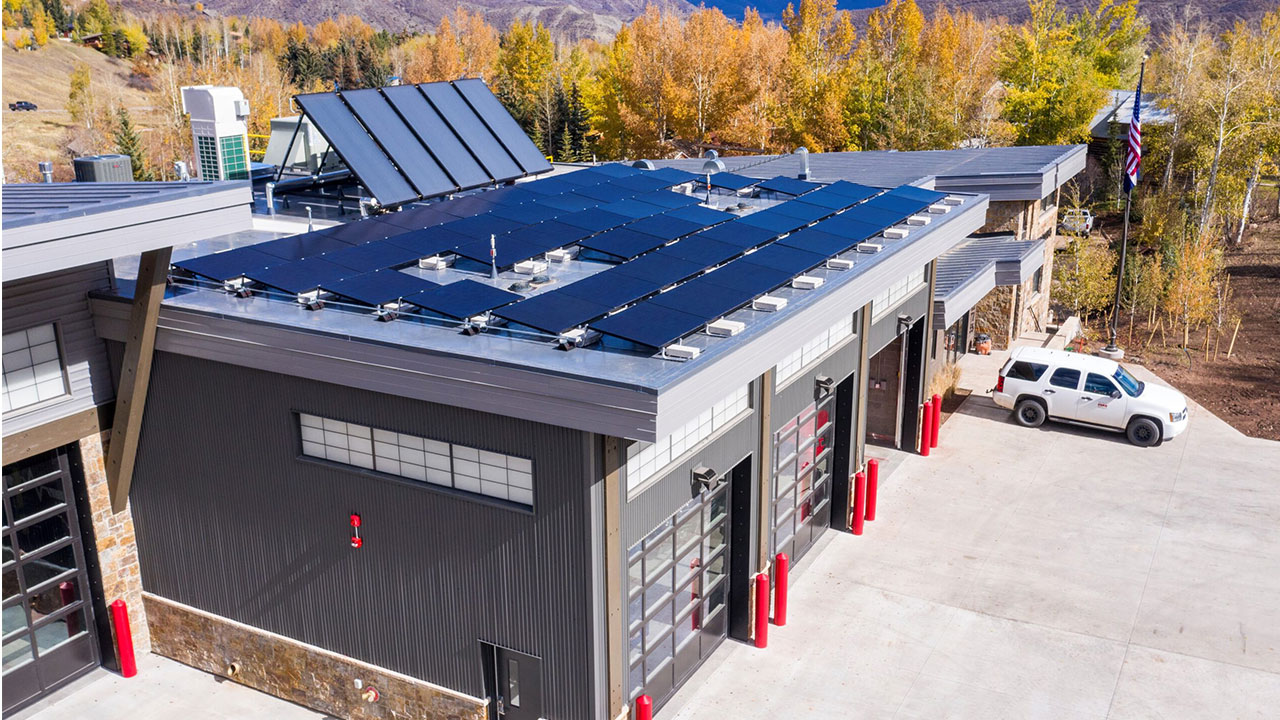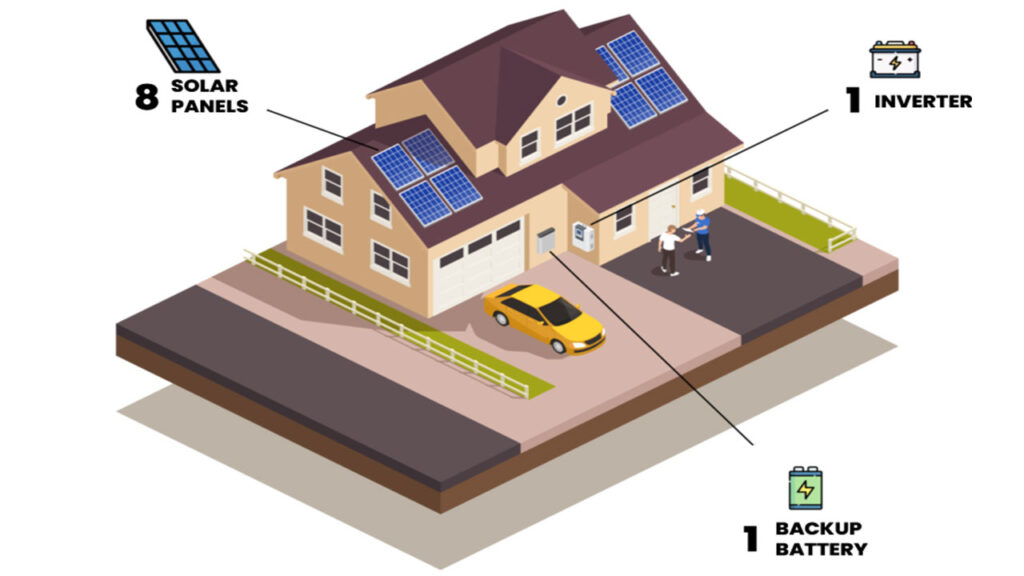Using Solar Electricity for Hospitals and Fire Stations
- Hossein_barati
- Article

Using Solar Electricity for Hospitals and Fire Stations , In today’s world, finding sustainable solutions for our power needs is a top priority . In hospitals, electricity is the lifeblood that powers critical medical equipment, also Fire stations, on the other hand, require electricity to fuel their communication systems, garage doors, lighting, and various other equipment for speedy emergency response.
Using Solar Electricity for Hospitals and Fire Stations: A Sustainable Solution for Power Needs
In today’s world, finding sustainable solutions for our power needs is a top priority. Hospitals and fire stations, as crucial public service institutions, require a constant and reliable source of electricity to effectively carry out their life-saving work. One innovative solution that has gained considerable attention is the use of solar electricity. Harnessing the power of the sun, solar energy offers numerous benefits and has the potential to revolutionize the way these essential facilities operate.

Understanding the Power Needs of Hospitals and Fire Stations
Before delving into the benefits of solar electricity, it is essential to comprehend the role electricity plays in healthcare and the importance of reliable power for fire stations. In hospitals, electricity is the lifeblood that powers critical medical equipment, lighting systems, and climate control. From operating rooms to intensive care units, each facility relies on a steady supply of electricity to ensure the health and safety of patients. Fire stations, on the other hand, require electricity to fuel their communication systems, garage doors, lighting, and various other equipment for speedy emergency response.
The Role of Electricity in Healthcare
Electricity is vital for healthcare institutions as it enables the operation of life-saving medical devices. From life support machines and diagnostic equipment to refrigeration units for vaccines and medications, hospitals heavily depend on electricity to provide quality care to patients. In the absence of reliable power, patient outcomes could be severely compromised, making electricity a pressing concern for the healthcare industry.
Imagine a scenario where a hospital is hit by a power outage. The consequences can be dire. Without electricity, medical professionals would be unable to perform surgeries, monitor patients’ vital signs, or even keep essential medications refrigerated. Lives would be at risk, and the ability to provide timely and effective healthcare would be severely hindered. This is why hospitals invest in backup power systems, such as generators, to ensure that critical operations can continue even during power disruptions.
The Importance of Using Solar Electricity in Fire Stations
For fire stations, uninterrupted electricity is crucial for maintaining communication networks and enabling swift response times. In emergency situations, timely information and coordination can make the difference between life and death. Furthermore, electricity is necessary to power tools and vehicles, ensuring that firefighters have the equipment they need to combat fires and rescue individuals.
Picture a fire station without electricity. The communication systems would be rendered useless, making it difficult to receive emergency calls and coordinate responses. Fire trucks would be unable to be quickly dispatched, delaying the crucial initial response to a fire or other emergency. The lack of power would also impact the training and maintenance of equipment, putting both firefighters and the community at risk. To mitigate these risks, fire stations have backup power systems in place, allowing them to continue their operations even during power outages.
The Basics of Using Solar Electricity
Solar electricity harnesses the power of sunlight to generate electricity through the use of solar panels. These panels are made up of photovoltaic cells, which convert sunlight into direct current (DC) electricity. This DC electricity is then converted to alternating current (AC) electricity, which is suitable for powering buildings and equipment. Installing solar panels on the roofs or open areas of hospitals and fire stations can provide a sustainable and renewable source of electricity that reduces reliance on fossil fuels.
How Solar Panels Work
Solar panels work by utilizing the photovoltaic effect, which is the process that converts sunlight into electricity. Each photovoltaic cell consists of two layers of silicon, with one layer having a positive charge and the other a negative charge. When sunlight strikes these cells, photons from the sunlight excite electrons in the silicon atoms, generating an electric current. This current is then directed towards an inverter, which converts it into usable AC electricity.
The Benefits of Using Solar Electricity
Solar energy offers numerous benefits, making it an attractive option for hospitals and fire stations. Firstly, it is a clean and renewable energy source, producing no harmful emissions or pollutants that contribute to climate change and air pollution. By adopting solar electricity, these institutions can significantly reduce their carbon footprint, aligning their operations with global sustainability goals. Additionally, solar energy is abundant and readily available, making it a highly reliable source of power in most regions.
Moreover, the installation of solar panels can also lead to significant cost savings for hospitals and fire stations. Once the initial investment is made, the sun’s energy is free, and the panels require minimal maintenance. This means that over time, the institutions can save a substantial amount of money on their electricity bills, allowing them to allocate more resources towards their core services and improving patient care or emergency response capabilities.
Furthermore, solar energy systems can also provide a degree of energy independence for hospitals and fire stations. By generating their own electricity, these institutions are less reliant on the grid, reducing the risk of power outages during natural disasters or other emergencies. This energy independence can be crucial in ensuring uninterrupted operations, especially in critical situations where reliable power is essential for patient care or emergency response efforts.
The Transition to Solar Power in Public Services
While the concept of using solar electricity in hospitals and fire stations seems appealing, several factors need to be considered for a successful transition. Assessing the feasibility of solar power and addressing potential challenges are essential steps in the adoption process.
The Feasibility of Solar Power in Hospitals and Fire Stations
One crucial aspect to determine is whether solar power is a viable option for these facilities. Factors such as available roof or open space for installing solar panels, the amount of sunlight the area receives, and the required electricity demand must be thoroughly analyzed. Conducting feasibility studies and consulting with solar energy experts can aid in making informed decisions regarding the adoption of solar power.
Moreover, it is important to consider the specific needs of hospitals and fire stations. These facilities operate 24/7 and require a constant and reliable power supply. Therefore, a comprehensive analysis of their energy consumption patterns and backup power systems is necessary to ensure that solar power can meet their demands consistently. By carefully evaluating these factors, decision-makers can determine the feasibility of integrating solar electricity into public services.
Overcoming Challenges in the Transition
Although solar energy presents numerous advantages, there are challenges that need to be addressed to ensure a smooth transition. One potential issue is the initial cost of installing solar panels, as it can be a significant investment. However, considering the long-term cost efficiency and potential savings on electricity bills, solar power can offer a return on investment over time.
In addition to financial considerations, ensuring proper maintenance and upkeep of panels is essential to maximize their efficiency and durability. Regular inspections, cleaning, and repairs are necessary to keep the solar power system functioning optimally. Implementing a comprehensive maintenance plan and training staff members on panel care can help mitigate potential issues and extend the lifespan of the solar panels.
Furthermore, integrating solar power into public services requires collaboration and coordination among various stakeholders. Engaging with local governments, utility companies, and community organizations can facilitate the transition by leveraging their expertise, resources, and support. By fostering partnerships and creating a network of solar-powered public services, the overall impact and benefits of solar energy can be maximized.
The Impact of Solar Power on Sustainability
Beyond the direct benefits to hospitals and fire stations, solar electricity has a far-reaching impact on sustainability and the environment.
Reducing Carbon Footprint with Solar Energy
As mentioned earlier, solar energy produces no greenhouse gas emissions during operation, making it an ideal choice for reducing carbon footprint. By using solar power, hospitals and fire stations can contribute significantly to mitigating climate change and promoting a sustainable future.
Long-term Cost Efficiency of Solar Power
While the initial investment for implementing solar power may be high, the long-term cost efficiency is undeniable. Hospitals and fire stations can benefit from reduced electricity bills, as solar energy is a free and abundant resource. The savings accrued over time can be directed towards improving healthcare services or enhancing firefighting capabilities, ultimately benefiting the community.
Future Prospects of Solar Power in Public Services
The future of solar power in hospitals and fire stations looks promising, with ongoing innovations and supportive policies.
Innovations in Solar Technology for Improved Efficiency
The development of new technologies in solar panels and energy storage systems holds immense potential for improving the efficiency and effectiveness of solar power in public services. Advancements in battery technologies, for instance, can enable better storage and utilization of solar energy, ensuring a continuous supply of electricity even during periods of low sunlight.

Policy and Regulation for Encouraging Solar Power Use
To foster the adoption of solar power in hospitals and fire stations, supportive policies and regulations that incentivize renewable energy are crucial. Governments and local authorities have a role to play in promoting and facilitating the installation of solar panels through financial incentives, tax breaks, and streamlined permitting processes. Proactive measures in policy-making can accelerate the transition to solar power in public services.
In conclusion, the utilization of solar electricity in hospitals and fire stations provides a sustainable and reliable solution for their power needs. By understanding the specific power requirements of these institutions and the basics of solar energy, we can grasp the benefits and potential challenges associated with solar power adoption. Moreover, the positive impact on sustainability and the future prospects of solar power indicate a path towards a greener and more resilient public service infrastructure.
Set up solar power station with Tabdil Energy Roshana equipment
Tabdil Energy Roshana is a company that can help you to easily set up solar power stations in your house, office and your company. This company also sells the Polycrystalline solar panel and Monocrystalline solar panel to Use clean solar energy.
Introducing Tabdil Energy Roshana
Tabdil Energy Roshana Group is trying to easily meet the needs of factories and homes by using clean solar energy. The use green solar energy as a renewable solar energy has been done in developed countries for years.
The purpose of our activity in this company is to promote the use of clean and renewable energy from the sun in domestic and power plant dimensions. In 1401 AH, the experienced and young team of Tabdil Energy succeeded in receiving a knowledge-based certificate from the Vice President for Research.

The main activities of Tabdil Energy Roshana company
One of the most important activities of this group is set up solar power station, installing a solar panel, setting up a photovoltaic power plant, installing a Solar energy inverter, installing a solar battery, setting up an On grid solar power plant or Off grid solar system, installing and setting up home solar electricity to Use reproducible energy or Use green energy or Use photovoltaic technology or Use solar UPS . You can easily refer to the products page of this collection and get to know our services and products well.
The use of solar energy, in addition to the beneficial environmental effects, can be a long-term investment with a very good profit. Tabdil Energy consultants are by your side to guide you by providing expert advice on setting up a home solar site, solar power plant, and also the benefits of investing in this field.



